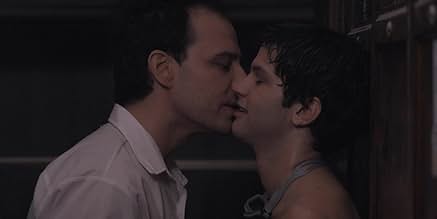NOTE IMDb
6,3/10
2,8 k
MA NOTE
Une relation ambiguë se noue entre un maître-nageur et un de ses élèves.Une relation ambiguë se noue entre un maître-nageur et un de ses élèves.Une relation ambiguë se noue entre un maître-nageur et un de ses élèves.
- Réalisation
- Scénario
- Casting principal
- Récompenses
- 2 victoires et 2 nominations au total
Carlos Echevarría
- Sebastián
- (as Carlos Echavarría)
Joan Alsina
- Alumno 2
- (as Juan Alsina)
Laura Dozo
- Oftalmóloga
- (as Laura Dozzo)
Fiamma Boldessarini
- Profesora 3
- (as Fiamma Boldossarini)
Avis à la une
Really sad and really lovely. Beautifully made.. it's a dreamlike movie.
The story goes slow but the growing tension didn't let it be boring for a second.
It's been made very simple, short, yet absolutely complete.
The story goes slow but the growing tension didn't let it be boring for a second.
It's been made very simple, short, yet absolutely complete.
1. Quiet: This is one of the quietest gay theme I've seen so far. Two lead actors, Carlos Echevarría and Javier De Pietro pretty well fit it. But, their feeling and character delivered well by good acting, cinematography, and of course music.
2. Love: Interesting that director and also writer (Marco Berger) share point of view about love between adult and teenager, son and father, underling and boss, employee and director, student and teacher. There is always a gap between that two degrees. Marco Berger choose to combine that two degrees by growing love between student and his sport teacher. I guess everyone ever had some crush to their teacher but the tricky point, not everyone, just a few who dared taking chances step the line and take actions to get to know their teacher in very close way. The extreme part, to make love with their teacher. There are differences between crush and love. But, what I see in this film more than just crush. I guess Martín already know his teacher Sebastián far from just become his sport teacher. That's why he was taking chances to get to know his teacher closely by lying.
3. The Truth: Being lying there are always consequences. The fact that Sebastián was straight and he sense something "wrong" with Martín, he made some wall to keep him stay away from Martín. The truth end up tragic. Sebastián loose control and beat Martín because he cannot accept that facts that Martín lying to him and abuse his trust and kindness. Martín fall apart but hold himself to keep it up and prevent Sebastián being fired from school.
4. Forgiveness: I think there is no connection between Martín accident to his "break up" with Sebastián. Just a big coincidence. A very big coincidence. Sometimes, accident happen, but death is always the worst part. Sebastián turn to fall apart. Martín absence was killing him form inside. He take some of it as his fault. He break school's swimming pool window and drinking. His mind trying to cope that situation by imaginary of Martín still alive. He was sorry and Martín just smile. It was enough for him.
Addition, I don't think that event turn Sebastián become gay. After all, he is trying not be ignorance man anymore.
2. Love: Interesting that director and also writer (Marco Berger) share point of view about love between adult and teenager, son and father, underling and boss, employee and director, student and teacher. There is always a gap between that two degrees. Marco Berger choose to combine that two degrees by growing love between student and his sport teacher. I guess everyone ever had some crush to their teacher but the tricky point, not everyone, just a few who dared taking chances step the line and take actions to get to know their teacher in very close way. The extreme part, to make love with their teacher. There are differences between crush and love. But, what I see in this film more than just crush. I guess Martín already know his teacher Sebastián far from just become his sport teacher. That's why he was taking chances to get to know his teacher closely by lying.
3. The Truth: Being lying there are always consequences. The fact that Sebastián was straight and he sense something "wrong" with Martín, he made some wall to keep him stay away from Martín. The truth end up tragic. Sebastián loose control and beat Martín because he cannot accept that facts that Martín lying to him and abuse his trust and kindness. Martín fall apart but hold himself to keep it up and prevent Sebastián being fired from school.
4. Forgiveness: I think there is no connection between Martín accident to his "break up" with Sebastián. Just a big coincidence. A very big coincidence. Sometimes, accident happen, but death is always the worst part. Sebastián turn to fall apart. Martín absence was killing him form inside. He take some of it as his fault. He break school's swimming pool window and drinking. His mind trying to cope that situation by imaginary of Martín still alive. He was sorry and Martín just smile. It was enough for him.
Addition, I don't think that event turn Sebastián become gay. After all, he is trying not be ignorance man anymore.
Infatuation and lust may have bad consequences, particularly if involving an adult and a minor, and it certainly involves misapprehensions and rumors, particularly if involving teacher-student of the same sex. Thus, a good basis for an intriguing film for relatively wide audience? But, alas, the result is a protracted depiction of facial expressions and trivial dialogues, with the main topic in the background, and otherwise spirited Latin Americans behave as those from the Nordic countries... The plot remains indistinct; I usually like to ponder on and over during or after a film, but here, it was no mind-twisting at all. Leaving things open and not explaining things are two different approaches for me.
Ausente could be a play for small niche theatres, but a film for a big festival? I was surprised when I read that the film won "Best feature film" during Berlin International Film Festival.
Ausente could be a play for small niche theatres, but a film for a big festival? I was surprised when I read that the film won "Best feature film" during Berlin International Film Festival.
I have just finished watching Marco Berger's "Ausente", and in spite of the Teddy award it won at the Berlin International Film Festival as Best Film with LGBT topic, I confess that all the enthusiasm that I felt when I saw "Plan B" vanished. All the freshness and sensuality of Berger's first motion picture, with actors who seemed to be improvising scenes and lines (or maybe they were really doing it) to give us a sincere reflection on how to reach honest acceptance of our homo-erotic feelings, was here replaced by a flow of contrived, too coldly calculated movements, to create a melodrama (not in the best tango tradition, but more in a soapy middle class mold) which is often more corny than moving. The story of a professor's harassment by his adolescent student, who is trying to seduce his teacher with lies, is slowly displaced by a subplot that pays too much attention to public opinion, prejudice, fear and slander, that is probably more in the mind of the instructor, who in the end is not as transparent as he had thought. Although Berger still favors setting up his camera at the level of men's crotches in underwear while lying in bed, this time those shots seem tamed as he was too much assimilated (perhaps far too much) by the discreet charm of the Argentinean film industry and its frequent pomp (careful, I do not mean the other Argentinean cinema, so independent and liberating- and without Ricardo Darín in the leading role, of course!), with sugary music that even includes a little female voice doing "Aaahhh's" Both Carlos Echevarría as the professor and Javier de Pietro as the student are good, given the material they had to work with.
It could represent a dessapointment when you expect a clear, precise, mind twisting film about a real delicate subject. But it is , first, a correct movie, using the suggestion as basic tool for a not comfortable conflict, love, seduction and temptation story. A teacher. And his student. A night and a mistake based on lie. And a powerful kick to put all elements in the right order. "Ausente" is just a beautiful film. Not a revelation, not the film who can provoke revolutions. But a honest story who seems endless because it is the only reasonable way for give this sort of story. So, a beautiful film.
Meilleurs choix
Connectez-vous pour évaluer et suivre la liste de favoris afin de recevoir des recommandations personnalisées
- How long is Absent?Alimenté par Alexa
Détails
- Date de sortie
- Pays d’origine
- Sites officiels
- Langue
- Aussi connu sous le nom de
- Ausente
- Lieux de tournage
- Sociétés de production
- Voir plus de crédits d'entreprise sur IMDbPro
- Durée1 heure 31 minutes
- Couleur
- Mixage
- Rapport de forme
- 1.85 : 1
- 16:9 HD
Contribuer à cette page
Suggérer une modification ou ajouter du contenu manquant
























